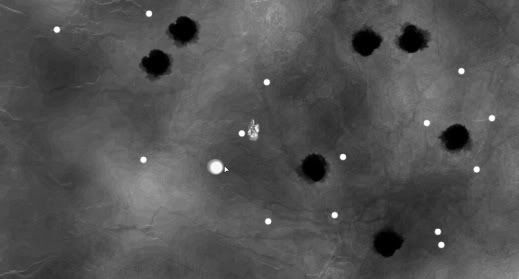
Ah, my second Global Game Jam in a row. You can play our game Shadowless here. The theme this year was Extinction and my team decided to make a game about light struggling to fend off darkness. At the end of the day Sunday, we ended up with a half done game that only slightly resembled the original design ambitions. Global Game Jam is about experimentation, and what's experimentation without failure? Sure, half the team was also trying to run the our GGJ location while making the game, but we also made some mistakes in the game's development. Here are a few things I learned this year:
1. Design discussions should only go as far as what you can build now.
During the first night of brainstorming, we discussed too many fancy game ideas. At one point the game involved a traveling beam of light, wading its way through an ever encroaching darkness. When it came time to building these grand ideas we found ourselves empty-handed. We hadn't come up with any basic gameplay to hold any of our original ideas up. Questions like, "What is the player doing from second to second?" and "How is this light beam interacting with this light crystal?" were not answered. In the end, all that time spent talking went to waste and most of the original ideas were thrown out.
On Saturday afternoon we hastily reworked the premise into what the game is now. Inspired by endless survival games like Tilt-to-Live, our game would incorporate the core gameplay of frantically navigating through swarms of enemies while giving the player a primary goal of keeping a light crystal alive at the center of the screen.
2. Remote team members won't get the full experience.
My artist friend Mike wanted to participate in our jam remotely from California. While we were able to give him work, he missed out on all the bleary-eyed fun and final presentations. I could have streamed him in over Skype, but bandwidth was at a premium. Besides, he would've spent most of the time staring at my sleep deprived face.
3. We neglected sound.
I've done this during a smaller Game Jam before. In the thick of programming our heads off, we just couldn't be bothered to take a listen to the sound effects that were just submitted. As a result, we couldn't get revisions to the artist in time. Maybe having a dedicated project manager there to organize everything would have helped but -- in the fast paced Game Jam environment -- I imagine that person would end up sitting around bored a lot.
2 comments:
Sorry to hear that it didn't go so well for you guys - makes me realize how lucky we got. Did you guys change direction on the design at all during the Game Jam? I like the core concept of the game though and I LOVE the art of the opening menu, and the music seemed very fitting as well.
I feel like our team (Team Nixon, who did C.O.O.P.) may have gotten lucky and snapped up two experienced Flixel programmers (myself and Will Swannick) right at the start - then we had another, Loren Hoffman, join us later. We also had a fourth programmer, Will Hubbell, a student who ended up learning quickly and contributing a ton.
So I'm sure the teams weren't all created equal and I feel like we got very lucky... I think that everyone on every team learned a lot though, and to me that's more than half the point of the GGJ!
you should also consider doing pre-mortems with your team. a method/game i learned in sunni brown & co's book, "Gamestorming" (different types of gaming).
Post a Comment